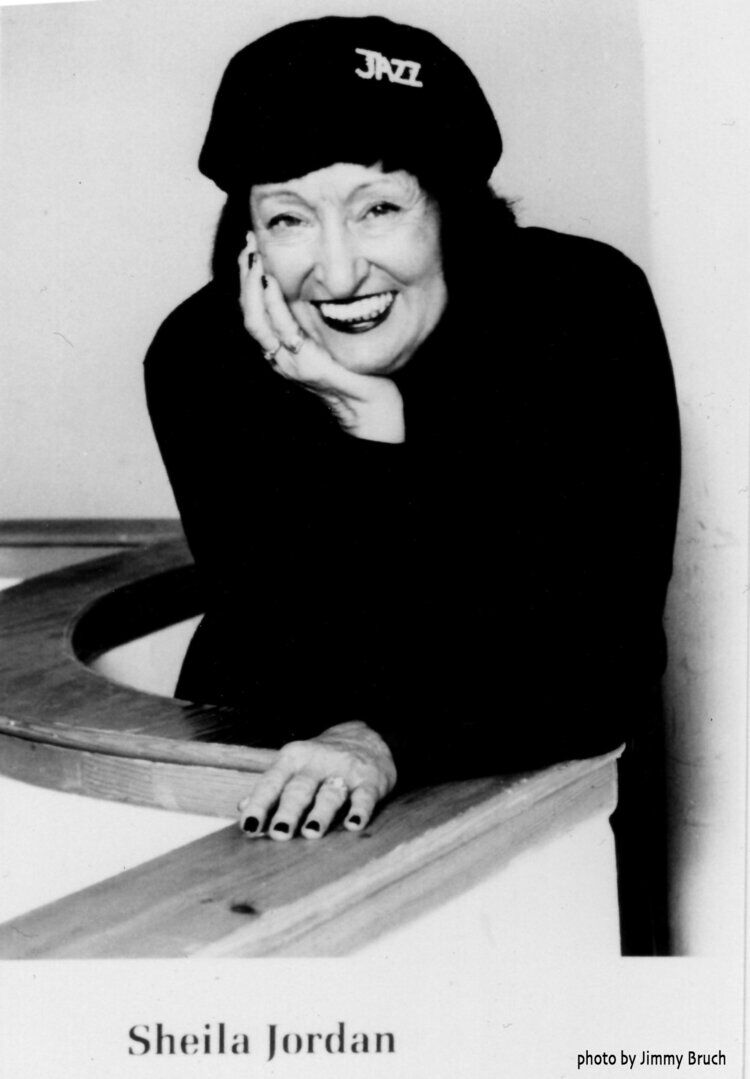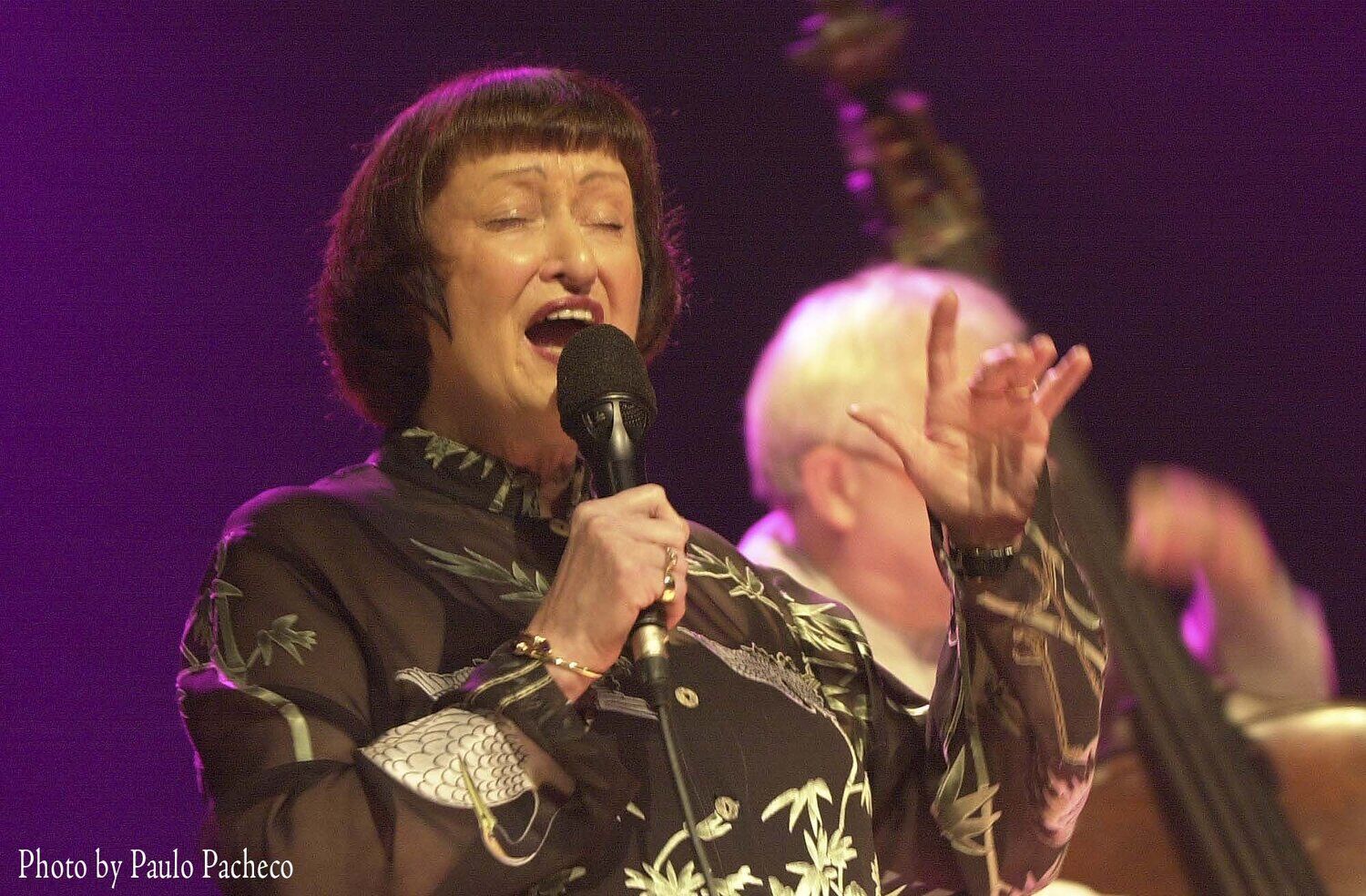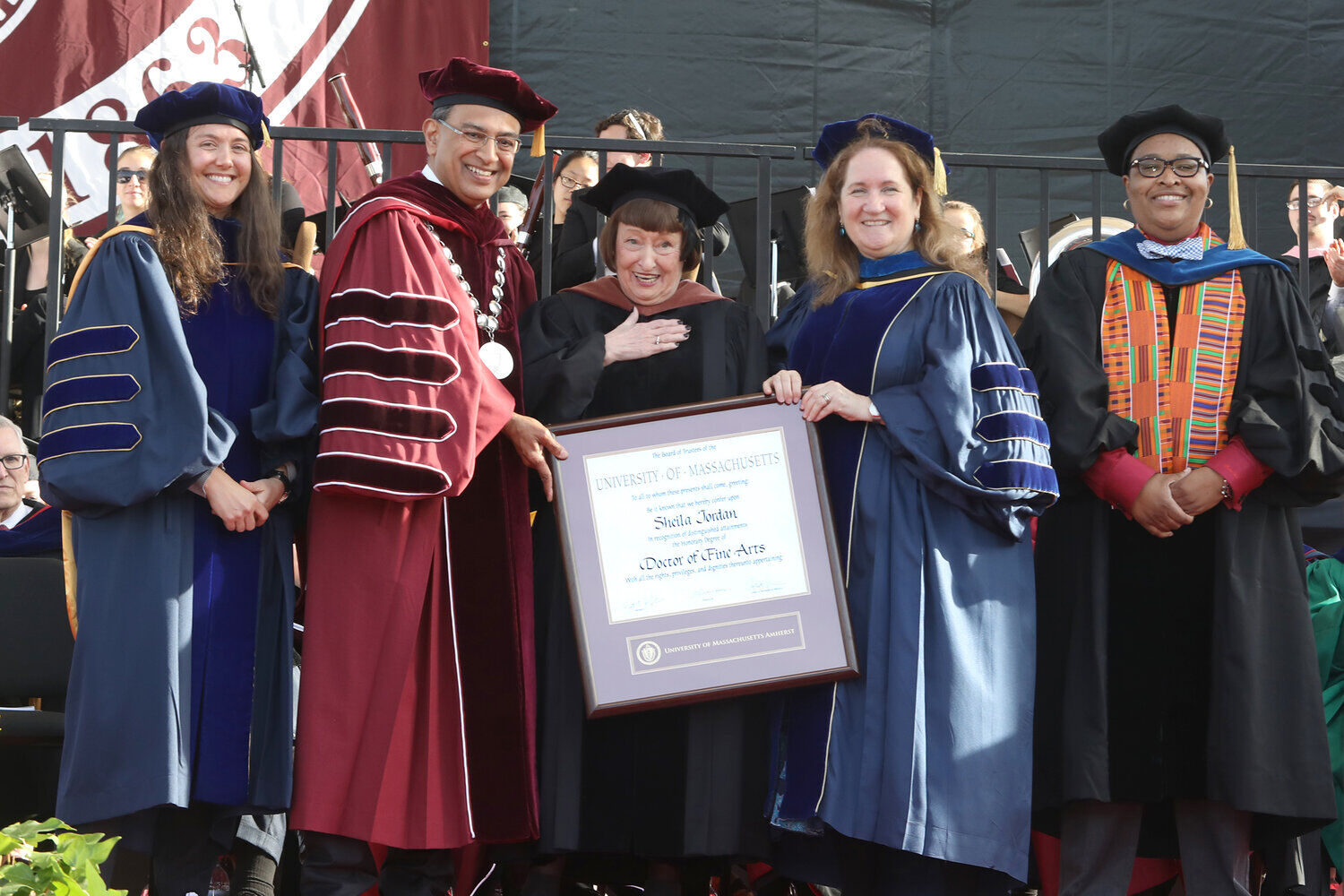There may be some question about whether certain singers are “jazz” singers, but there is no question about Sheila Jordan’s jazz bona fides. She has a pedigree that goes back to sitting in with Charlie Parker in the 1940s and continues up to the present day. She knew from the first time she heard Bird that this was the music she wanted to devote her life to and she has. Her roots are in Bop, but she is constantly experimenting to discover new vocal approaches to the music. She is preeminent in a format few singers will undertake, which is performing just with bass—no keyboard or other instruments. She can handle it, which Bird knew when he said she was “the kid with the million dollar ears.”
She led what may have been the first jazz vocal workshop in 1978 at City College of New York and has become a renowned and inspiring teacher. Her dedication to the music is matched only by her stamina, as she has continued to travel to teach and perform into her early 90s. She has received a significant number of awards, including being named an NEA Jazz Master in 2011. I was fortunate to have her on my radio program a few years ago and her spirit is infectious, as anyone who has met or watched her perform can attest. I heartily suggest her autobiography Jazz Child. She was kind enough to respond to some questions via email and I have edited her responses (and eliminated my questions) in order to give you the clearest sense of her voice
Sheila Jordan: I never knew my father, and my mother couldn’t take care of me, so I was sent to my grandparents who loved in a small mining town in Pennsylvania. My grandfather’s grandmother was Queen Aliquippa of the Seneca nation. She actually met George Washington and he gave her a bottle of rum. She’d never had alcohol and I think that’s where the alcoholism in my family came from. My grandfather was a good housepainter, but all of his money went to buy alcohol. We were probably the poorest people in a poor town, with no toilet or water inside and had to walk half a block to use the toilet.
I loved to sing and would break out into song any time. I sang the songs from my era- “My Ideal, “I’ll Never Smile Again.” At that time, they used to sell magazines that had the lyrics to the songs and I would save money from scrubbing floors and doing errands, then I’d walk two miles to buy the magazines. My grandparents belonged to a club called the Bundt Club, which was a private club for coal miners. I’m not sure how they got into it, but I’d sing there and the miners and their women would throw money at me. My grandmother would say “Don’t pick it up until you’ve finished the song! They might throw more!”
“You Are My Sunshine” was like the miner’s song and I’d sing that one all the time. They used to have me sing after school at the PTA meetings, but the kids made fun of me because of my name—Sheila was an unusual name back then—and I got very insecure and stopped singing from the 6th grade until high school.
In my first year of high school, my grandfather and my mother had a big fight and he said you take her back, so I went to Detroit and lived with my mother. I finished out the school year there and the music teacher got me back into singing. I loved to sing, but didn’t know what kind of music I wanted to sing.
 There was a jukebox in a place across the street from the school. I put my nickel in, pushed the button and on comes Bird with “Now’s the Time.” Charlie Parker and His Reboppers. That was it, five notes, oh my god, my skin was crawling. I said, this is the music I’ve been looking for. I’ll dedicate my life to it, whether I sing it, teach it, or just support it. Every cent that I made, I would use to buy Charlie Parker records.
There was a jukebox in a place across the street from the school. I put my nickel in, pushed the button and on comes Bird with “Now’s the Time.” Charlie Parker and His Reboppers. That was it, five notes, oh my god, my skin was crawling. I said, this is the music I’ve been looking for. I’ll dedicate my life to it, whether I sing it, teach it, or just support it. Every cent that I made, I would use to buy Charlie Parker records.
I was finishing high school and had a part time job and I was having a really bad time at home. My mother’s latest husband was coming on to me. I found out you could rent a room at the Evangeline Home For Young Women, so when I was 17, that’s what I did. I would go to the little jazz clubs where they didn’t serve alcohol and come back before curfew.
There were a lot of young jazz musicians in Detroit. Kenny Burrell, Barry Harris, Tommy Flanagan were all hanging around outside the clubs, listening to the music. I met two guys at the Club Sudan, for teenagers—Skeeter Spight and Leroy Mitchell.
None of us was old enough to get into the bars—and they sang all the bebop heads. Skeeter was the greatest scat singer I ever heard in my life and he never recorded. When they were through singing, I said I’d love to sing with you. They looked at me like “who is this little white girl.” So I sang, I think it was “Confirmation,” and they were shocked. I was drinking at the time, which they could tell and they said you can sing with us, but you have to stop drinking and you know what—I did. So, we started to rehearse, but it was a drag because the cops were always on my case for hanging out with Afro-Americans and would take me to the police station.
We went to see Bird at the Greystone ballroom and his tenor player Billy Mitchell said to Bird that there were three people in the house who sang his music. Bird announced to the audience “I have a treat tonight for you all. There are some people in here tonight who sing my compositions and I’d like them to come up and sing.” We wondered who he was talking about and Bird looked at us and said: “Yes, I’m talking about you guys.” We came up and sing. What a thrill.
Once when I tried to see Bird, I had forged my mother’s birth certificate and the guy at the door said “Are you kidding?” So I went around in the back and the back door was open so I could hear the music. I was sitting there on a garbage can and somehow Bird knew I was there and came outside and played a solo for me. I‘ll never forget that.
Frank Foster [saxophonist] moved to Detroit from Ohio and we started to go out. He asked me if I wanted to move in with him, so I said “Yea!” He was my very first boyfriend. We were together until he was drafted. I think it was the Korean War. When that happened, I moved to New York, which I’d always wanted to anyway, so I could be near Bird. Bird had said: “If you ever come to New York, look me up” and given me his telephone number, so I went to the old Birdland and amazingly, he recognized me. That’s where I met Duke Jordan [pianist], who was playing with him. The rest is history. [Sheila had a child with Pearson, got married and divorced. He was deep in the thrall of heroin.]
I had good office skills and I got a job working at the ad agency Doyle Dane Bernbach, which I loved and where I stayed for years. After work, I’d go out to hear music—instrumentalists, not vocalists. I started going down to this little jazz club in the village called Page Three, near the Village Vanguard. I went down and sang in Jazz Session Night and they asked me if I wanted to work a couple of nights a week, so I said sure. I used to try out songs I wanted to learn and get the keys together; made a list of the songs I did. Get things together. So, I had a job, my daughter was in nursery school and I had a lady who would come in and watch my daughter when I went out to sing. I made six dollars, gave the lady four dollars and since it was four in the morning, I had to take a cab home. You can see I didn’t do it for the money.

There was a piano player there, Jack Riley, who had studied with George Russell and George came in to hear Steve Swallow, the bass player. He came over to me (I had no idea who George Russell was) he said to me “Where do you come from?” I said [with an attitude] “I come from hell, man.” He said “Really, I’d like to visit hell with you one day.” Then, Swallow told me he was a great composer and arranger. So, I gave him my telephone number, never thinking he’d call, but he did and he said “Are you ready to go back and visit hell, ‘cause I am.” I said “Oh really, you want to go back to Pennsylvania?” and he said yea, so we got into his little green Volkswagen and drove to Pennsylvania from New York City.
My grandmother was still alive—she had a drinking problem—she said let’s go to the Bundt. There was only one person there, an old out-of-work coal miner and he said: “Do you still sing ‘You Are My Sunshine,’ Jeannie?”—cause that was my nickname back then—and I said no and he said “Why not?” and George said “Yea, why not?” There was an old, really out-of-tune upright in the corner and George sat down and started to play way out, which was wonderful, but my grandmother was like “What is he doing,” literally pushed him off the bench and said “That’s not the way it goes, George” and she sat down and played it and I sang it.
Back in New York City, George called me up and asked me if I wanted to come over and hear something. I went over and he started to play this incredible music and then all of a sudden he stopped. Then he said, “Okay, sing.” I said, “Sing what?” He said. “‘You Are My Sunshine.’” I said, “Are you gonna accompany me?” and he said, “No. You sang it alone when you were a kid, right? Sing it, now!” And so I did.
It wasn’t long after that that he called me to come into the studio for Riverside records. He said he had a surprise for me. I walked in and George started to play this whole beautiful thing. I didn’t know it was “You Are My Sunshine” then they cut and he said, “Okay, get in the booth and sing it alone, like you did.” So we recorded it. I think it was just one or two takes. He wanted to change the title to “A Drinking Song,” but the composers wouldn’t let him. But, he dedicated that composition, which is on the “Outer View,” to the out of work coal miners.
Then George put me in the studio with Steve Swallow [bass], Barry Galbraith [guitar] and Denzel Best [drums] and did a demo. He took that demo to Mercury (Quincy Jones, who liked it) but he had taken it first to Blue Note. They’d never recorded a singer, but they wanted to record me and so I was the first singer on Blue Note records. That was in 1962. Portrait of Sheila.
I never studied singing. Before my daughter was born, Max Roach and Charles Mingus recommended studying with Lennie Tristano, and helped convince him to take me. I studied with him about 1953-54 and I was the only singer he taught.
I love the freedom and the space of just working with a bass. I don’t know, maybe I was a bass player in a previous life. I had done a lot of [bass] things with Steve Swallow at the Page Three and we did some gigs around, but he decided that he was going to play the electric bass and so I said no, I can’t do that. I had also sung with bass player Peter Ind, who worked with Lennie Tristano. I actually wanted that first Blue Note recording to be just voice and bass and they said no way.
I went with Steve Kuhn [pianist] and met Harvie S [bass, formerly Swartz] and I asked him if he had any interest in doing something with me. We were still with Kuhn, but we got together and rehearsed. You have to work out ideas and we put some things together, like the Dance Medley— “I Won’t Dance,” “I Could Have Danced”—and that’s my dedication to Fred Astaire, who I loved. [Sheila and Harvie worked together for decades.]
Jazz musicians from different states or countries call me up to work with them and I say fine, but we have to rehearse a day before. I want you to know what I do. I tell the piano player, “Play for me like you would for an instrumentalist”—I put my arm around them and give them confidence, not to put them down—I tell them I need a lot of space. How would you accompany an instrumentalist, that’s how you accompany me. Not a lot. I don’t need a lot.
I’ve never had any problems with audiences anywhere—and especially in Europe. Italy, France, England, Cannes, Germany, audiences in the United States. Asia’s fantastic. Usually the audience that comes to hear me knows the music or likes the music so they know what to expect. I haven’t been booed yet…I’m not crazy about singing outside, because it’s not intimate and I don’t have a big voice, but when I open my mouth to sing, I’m always into it and then the audience gets into it. I got a standing ovation last year at the Detroit jazz Festival outside last year and I was shocked.

Women are finally being accepted in jazz. They’re finally getting rid of “she plays great for a chick.” I hate that. And it was a male jazz instrumentalist who would say it. Come on, man. I don’t think it’s as bad as it used to be. There are too many great female jazz instrumentalists coming up. You just can’t ignore them.
I really love teaching. If I’m doing a good workshop, it’s the same feeling I get when I’m doing a good concert. I tell my students “Don’t try to copy other singers. Be inspired by Ella, by Billie, by all the great singers who came before you, but don’t copy them. That’s their story, that’s their life. Be inspired, but sing your story, sing your life.” That’s the first thing I teach.
When you want to get a song you’ve heard a singer do, don’t learn it from the recording of that singer. Go and get the original music and learn it exactly as its written, cause almost all the time, the singer is changing it to their own feeling, their own thing. For god’s sake don’t try to learn a song off of me! Learning the original melodies is a stepping-stone to improvisation. If you know the way it’s written, you’ll never get lost. It’s only when you don’t learn what’s there originally that you can get lost. Then learn the chords, get a little guideline going and don’t try to overdo it.
Sing from your heart, man, that’s what I tell them. Don’t try to be like “I wanna shock people.” Forget that, man. That’s not what this music is about. This music’s about your soul, your life, about your heart. That’s what it’s about. What is your life? What are you feeling? Pick songs that mean something to you. Don’t sing a song just because somebody else did it but you don’t really have a feeling for the song, but you’ll do it anyway because somebody else made it popular. No, pick tunes that really mean something—that you really dig.
I never listen to myself, Steve. I just listen after I record—what I picked, is it okay? I hear the end result one time and then I never listen again.
[No, Sheila, but we do.]
Visit Sheila Jordan online at www.sheilajordanjazz.com.
Steve Provizer is a brass player, arranger and writer. He has written about jazz for a number of print and online publications and has blogged for a number of years at: brilliantcornersabostonjazzblog.blogspot.com. He is also a proud member of the Screen Actors Guild.






















